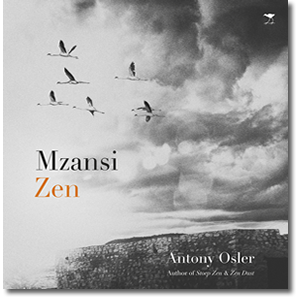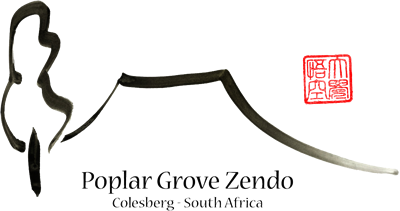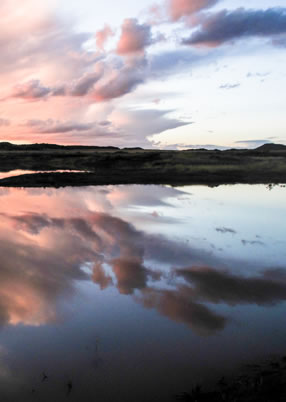BOOKS
Mzansi Zen (Jacana) published in 2016
 Mzansi Zen is an affectionate, challenging and witty blend of stories, commentaries and poems about life in present-day South Africa. These are threaded through a day in an actual Zen retreat and are accompanied by wonderful photos and original drawings. Mzansi Zen is an affectionate, challenging and witty blend of stories, commentaries and poems about life in present-day South Africa. These are threaded through a day in an actual Zen retreat and are accompanied by wonderful photos and original drawings.
The author’s familiar and authoritative Zen style inspires us into taking up this life with both hands, calling us into an intimacy that is already beneath our feet.
Read it. It will change your mind and open your heart.
Zen Dust (Jacana) published in 2012
 In this follow-up to his much loved Stoep Zen, Antony takes a trip down the lesser known back roads of the Karoo, from Kimberley to Colesberg, finding divinity in the dust and a Buddha in every pothole. In this follow-up to his much loved Stoep Zen, Antony takes a trip down the lesser known back roads of the Karoo, from Kimberley to Colesberg, finding divinity in the dust and a Buddha in every pothole.
We are all of us on our way home. And, as Osler’s journey teaches us, as long as our eyes and hearts are open we belong wherever we go. In this way, however far we travel, our true home is always where we are.
With gentle wisdom and deep compassion, Osler connects with the people he meets along the way and shares their stories, past and present, as well as his own personal history and insights. The road is sprinkled with his special brand of poetry and interwoven with a fresh telling of the tale of Gotama, the man who would become Buddha.
Whether on familiar terrain or new territory, Antony never loses his sense of wonder. And he doesn’t shy away from the conundrums of a country in flux. Instead, he delights in the ordinary and infuses it with grace. Each encounter is a gift and his generosity in sharing will become a treasure on every bookshelf.
Stoep Zen (Jacana) published 2008
 Lao Tsu meets Oom Schalk Lourens in this delightful meditation on what it means to practice Zen in a changing South Africa. Lao Tsu meets Oom Schalk Lourens in this delightful meditation on what it means to practice Zen in a changing South Africa.
Antony Osler contemplates life as it passes by the stoep of his Karoo farm, sharing anecdotes and conversations, poetic images and indelible characters, watching the seasons, the people and his country as everything changes - sometimes radically - just so.
South Africa has experienced one of the most riveting, frightening and inspiring political revolutions in history. How, Osler asks himself, do we dance with this? How do we reach down through swirling emotions into quieter space where we can see a little further, love a little deeper, laugh a little louder?
‘I lift my eyes to Loskop and fear no evil. But if I don’t watch my step, I will fall into an aardvarkgat.’
Zen practice is to find the heart of each moment. Osler’s book is as full of heart as it is of wisdom; his musings on humility, acceptance, reconciliation and love are gentle - and often humorous - reminders of what it is to be human.
Zen Dust and Mzansi Zen are now out of print.
Stoep Zen, Zen Dust and Mzansi Zen have all been reprinted and are available from good book stores or order a signed copy from margie@ stoepzen.co.za.
PRACTICE NOTE
For almost all of us, Zen practice is not a full-time monastic life-style. We attend retreats, we pursue careers, support families, check our finances; we spend time hiking, surfing waves or internet, blowing the trumpet, visiting friends.
One of the things we notice is the long gap between retreats. We make considerable effort to get to Poplar Grove for a week and then we find ourselves back home. We will be inspired, filled with good Dharma intentions, do zazen each morning before breakfast and read koans for fun. But how difficult it is to keep this going! After a week or two of diligent home practice the momentum begins to dry up. We have to whip ourselves into good-zen-student form and eventually the whip wears out and our excuses get the upper hand. We are failures. Again!
Of course this will happen. This secular Zen is a particularly arduous path, one filled with all manner of detour and distraction. Monks and hermits have their own path and it is not this one. But we have an opportunity that monks and recluses do not have. How will we use it?
As ever, it is not about blaming or changing our circumstances but asking ourselves how best to live in whatever situation we find ourselves - at this time, among these people, with our own resources. One constant trap in a so-called spiritual journey is our endless conversation with ourselves about how we are doing. And this conversation (a monologue, actually) is conducted in the language of self, the language of measuring, comparing, self-blame, self-satisfaction, anxiety and doubt, riding the inevitable seesaw of contentment and discouragement. We do more, we do less, we cut here and add there; this is how the self works. It operates inside its own paradigm, turning round and round on the same axle; the hamster herself. Poor thing!
This is part of how it is. It doesn’t help to pretend otherwise. But somehow we also need access to fresh air, to things that fill our lungs and heart. We need to join the hamster liberation front. Home practice is part of it. Attending monthly gatherings or local retreats is part of it. Reading is part of it; walking outside, meeting friends, swimming, playing golf, dancing with your lover, singing with the children…. It is not the choice of activity or company that is crucial, but the way in which we do it. The simple act of bringing our attention back to where we are is really helpful; it creates small moments of attentive care and presence – what I call ritual. In ritual we make everyday things precious. We sanctify them. They remain ordinary but now they are sacred. Do we eat with friends as gentle Dharma practice itself? Do we surf out beyond the farthest waves like dolphins? Do we make love like Tibetan Dakinis? Do we play with children, cut wood, laugh, cry like the Buddhas we are? It is a thrilling prospect.
We will still admonish ourselves, despair and ask more of ourselves. But that is no longer the whole of it. For the windows of our life are open. We don’t only hear the whistling of the kettle and the squabbling of the children. We also hear the sounds of sea and birdsong - and traffic and radios. We may still have a daily discipline of sitting at home while the coffee brews. But we can also develop the ability to bring an unjudgemental presence to walking up the stairs, to folding our clothes, brushing our teeth, making the bed, taking a shower, driving the car….. And when we forget, that is not a problem. For we are strange creatures inhabited by both excruciating dullness and soaring aliveness.
Then we return to the zendo at Poplar Grove and help the old folk there.
Please look after yourselves.
With affection and gratitude to you all,
Antony and Margie Osler (Dae Chong and Tae Ja Do, Oshos)
Poplar Grove Zendo, October 2025

|


 Mzansi Zen is an affectionate, challenging and witty blend of stories, commentaries and poems about life in present-day South Africa. These are threaded through a day in an actual Zen retreat and are accompanied by wonderful photos and original drawings.
Mzansi Zen is an affectionate, challenging and witty blend of stories, commentaries and poems about life in present-day South Africa. These are threaded through a day in an actual Zen retreat and are accompanied by wonderful photos and original drawings.  In this follow-up to his much loved Stoep Zen, Antony takes a trip down the lesser known back roads of the Karoo, from Kimberley to Colesberg, finding divinity in the dust and a Buddha in every pothole.
In this follow-up to his much loved Stoep Zen, Antony takes a trip down the lesser known back roads of the Karoo, from Kimberley to Colesberg, finding divinity in the dust and a Buddha in every pothole. Lao Tsu meets Oom Schalk Lourens in this delightful meditation on what it means to practice Zen in a changing South Africa.
Lao Tsu meets Oom Schalk Lourens in this delightful meditation on what it means to practice Zen in a changing South Africa.
